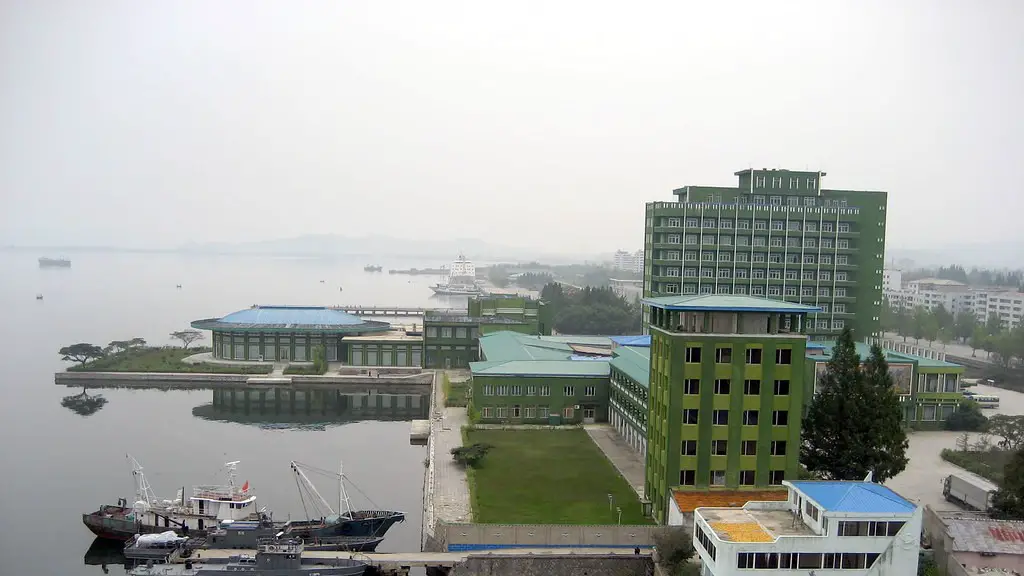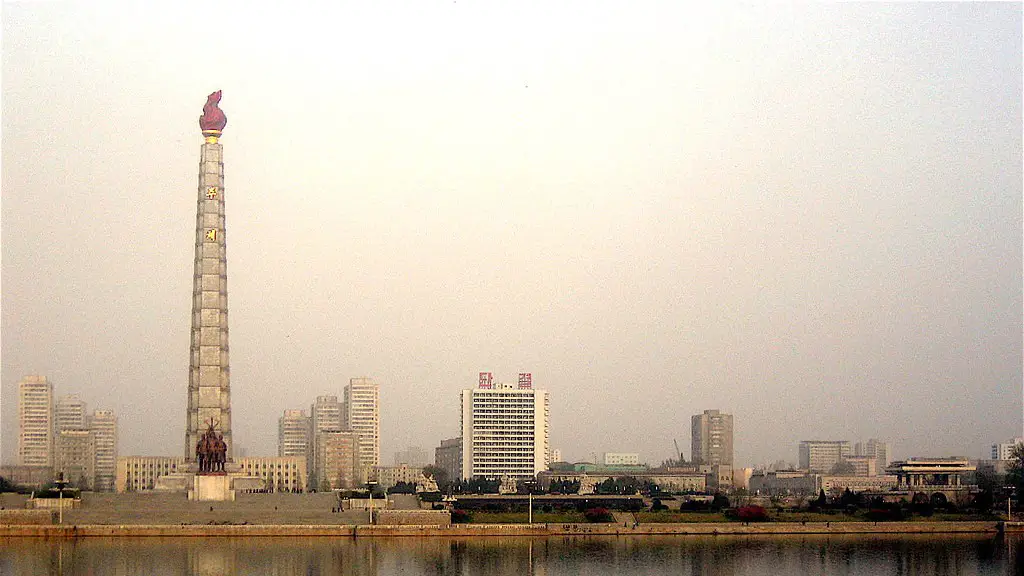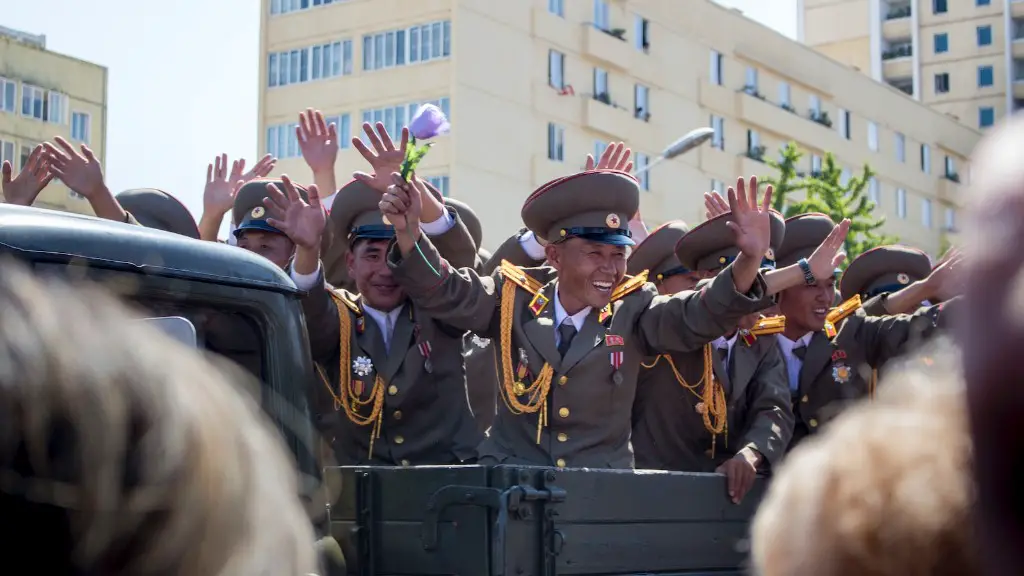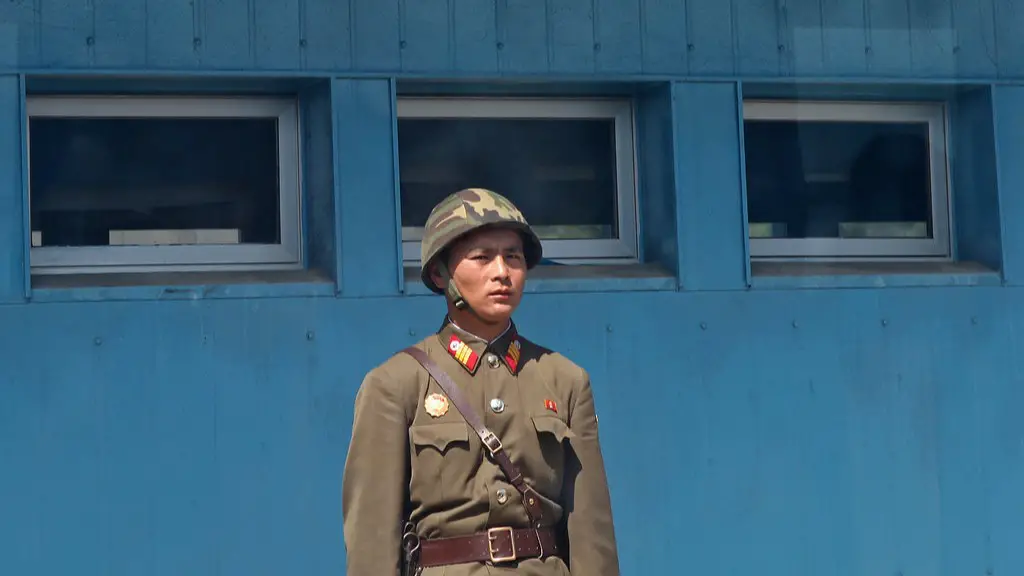North Korea is often in the news – but usually for not so good reasons. The nation, officially known as the Democratic People’s Republic of Korea (DPRK), has been locked in a tense stand-off with most of the world ever since it declared its formation as a state in 1948. It is no wonder, then, why so many are asking “Why are we enemies with North Korea?”. The answer to this question is both complicated and nuanced and requires an understanding of North Korea’s history and its current international standing.
At a basic level of international relations, North Korea is considered a state in ‘splendid isolation’ – meaning that it has few Diplomatic ties, only trades with a few select countries, and most importantly, does not recognise America or other western nations as legitimate. This, unsurprisingly, has caused a great deal of tension for many decades, creating a stand-off between North Korea and much of the western world. To make matters worse, North Korea’s current leader, Kim Jong Un, has aggressively pursued a policy of increased nuclearisation and international hostility.
Even though the terms of international law require all states to respect one another and make reservations for those who do not, North Korea has not reciprocated in the same way. They have routinely disregarded the warnings of international bodies to abstain from nuclear proliferation and they are known to have broken numerous international agreements in the past. This has raised alarm in countries such as the United States, which views North Korea as a ‘rogue state’ and a potential threat to its security.
It is therefore no surprise that the United States has responded to North Korea in a hostile manner. In addition to increased political pressure, the United States and other western countries imposed heavy sanctions on North Korea. These sanctions are focused on North Korea’s economy, targeting their ability to generate foreign income and encouraging North Korea to abandon its nuclear weapons program.
However, these strategies have had limited success. Despite the sanctions, North Korea continues to pursue its nuclear ambitions and it appears that these attempts have become increasingly bold in recent years. This has raised further concerns about the country’s intentions and its impact on diplomatic relations across the world.
To make matters even more complicated, North Korea’s relationship with its closest neighbour, South Korea, is also highly tense. The two countries technically remain in a state of war with one another, and the border between them is one of the most fortified military dividers in the world. This has had a significant impact on North Korea’s ability to conduct any meaningful diplomacy with the rest of the world.
Military Inducements
In addition to the tensions caused by North Korea’s nuclear capabilities, the United States and other western countries have been alarmed by North Korea’s military activities. North Korea has developed a large arsenal of conventional weapons, which it has frequently used to threaten the countries around it. This includes territorial disputes with both South Korea and Japan, and more recently, threats to completely destroy the United States.
These military threats have led to a surge in armaments from the United States and other western countries – both in terms of technology and hardware. The United States has increased its military presence in the region and has provided South Korea and Japan with a greater level of defence in order to guard against any potential threat from North Korea.
Furthermore, the US and other western powers have increased their economic and diplomatic pressure on North Korea. They have imposed harsh sanctions, and have placed an embargo on various Iranian and North Korean companies. Additionally, the US has led a campaign to push North Korea to abandon its nuclear ambitions and diplomatic ties with the rest of the world.
Not surprisingly, North Korea has responded to these measures with hostility. North Korean leadership has consistently denied any wrong-doing, and has accused the US and other western countries of meddling in North Korean affairs. North Korean officials have regularly threatened to use nuclear weapons against enemies of the regime, and recently issued a warning suggesting the country could stage a ‘decisive turn’ if nuclear disarmament talks fail, raising the possibility of a nuclear strike.
Economic Potential
Despite the tensions caused by North Korea’s nuclear ambitions and military activities, there is also much optimism about the country’s economic potential. Despite being one of the most isolated countries in the world, North Korea has a surprisingly strong economy. It is relatively wealthy compared to its neighbours, and is one of the most economically advanced countries in East Asia. The country also has vast natural resources, including minerals and oil, which could potentially be used to generate significant income.
Moreover, North Korea is also home to a highly educated population. This provides the potential for the country to develop cutting-edge technologies and for the growth of industries such as software and medical biotechnology. These developments could create new growth in North Korea’s economy, which, in turn, could lead to greater integration with the rest of the world.
Furthermore, in recent years there have been signs of progress on the diplomatic front as well. North Korea has expressed its willingness to sit down with the United States and engage in dialogue and negotiations. This is a promising sign for the future of North Korea’s relations with the West, and could lead to a new era of cooperation between the two countries.
Political Unrest
Whilst there are some hopeful signs, there is also much cause for concern. North Korea’s recent nuclear tests and provocation of South Korea have caused serious worries amongst the international community. In addition to this, there is also significant dissent amongst the people of North Korea – both within the country and abroad.
The largely closed nature of North Korea’s political system means that it is difficult to ascertain the true extent of discontent in the country. However, some accounts from people who have escaped the country suggest a high level of discontent amongst ordinary citizens. This is due to a number of factors, including restrictions on civil and political freedoms, a lack of economic opportunities, corruption and poverty.
This dissatisfaction has even been expressed in forms of public protest, though these are usually dealt with swiftly by the authorities. Nevertheless, the protests demonstrate that there is a real dissatisfaction amongst the people of North Korea, and this further fuels the tensions between North Korea and much of the rest of the world.
International Fear
With North Korea’s nuclear program and its frequent military posturing, there is a real fear amongst many nations that the country could pose a serious threat to the international community. This fear has been reinforced by North Korea’s consistent refusal to abide by diplomatic agreements and its unwillingness to abandon its nuclear ambitions. As a result, many countries have adopted a policy of deterrence towards North Korea, and this has further exacerbated the tension between the two sides.
The United States and other western countries have also expressed fear that North Korea could use its nuclear weapons and ballistic missiles to launch an attack against its enemies. There have been several occasions in which North Korean leaders have threatened to use force against the US and other countries, and this has caused alarm amongst these states. As a result, the US has maintained a strong policy of deterrence against North Korea, in the hope of avoiding all-out war.
This policy of deterrence has been largely successful so far, but it has also helped to further solidify North Korea’s status as a rogue state. This has made it difficult for the international community to get North Korea to take responsible action and abide by international agreements. As a result, there is still much uncertainty as to what the future holds for North Korea, and the surrounding nations.
Approaching Reconciliation
In recent years, there have been some hopeful signs of a thawing in relations between North Korea and much of the world. This includes the historic summit between North Korean leader Kim Jong Un and US President Donald Trump in Singapore in 2018, which has raised expectations of true bilateral reconciliation between the two nations.
Moreover, North Korea has also taken steps to open itself up to foreign investment, with a particular focus on economic development. A number of western companies have also started to show interest in doing business with North Korea, and this may provide the basis for new diplomatic and economic ties in the future.
Finally, North Korea has also opened up to its neighbours. They have held several rounds of talks with South Korea to discuss the possibility of formal reconciliation and reunification. This could potentially herald a new period of stability in the region, with the possibility of greater economic and diplomatic ties in the future.
Seeking Understanding
Ultimately, the question of why we are enemies with North Korea is complicated and nuanced. There are many factors that must be taken into consideration – from North Korea’s history and current international standing, to the fear caused by its nuclear ambitions and military activities.
However, it is clear that there is also much potential for reconciliation between North Korea and the rest of the world. For this to happen, there must be an effort to understand North Korea’s motivations and to work towards peaceful dialogue. Only then can we truly begin to unravel the complex web of why we are enemies with North Korea.





